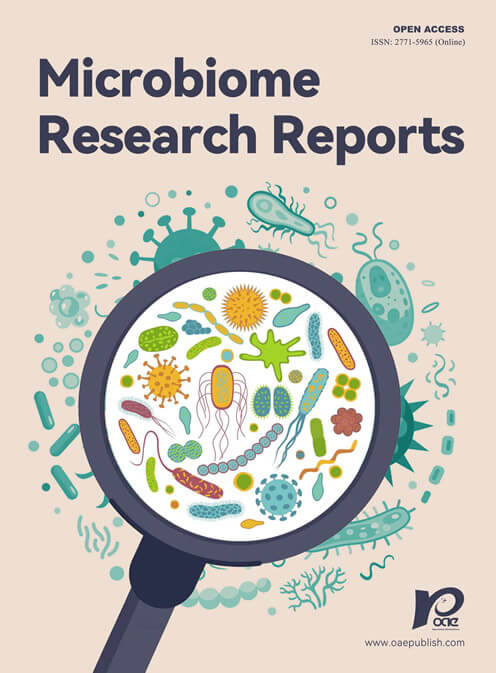REFERENCES
1. Sears CL, Salzberg SL. Microbial diagnostics for cancer: a step forward but not prime time yet. Cancer Cell. 2020;37:625-7.
2. Livyatan I, Nejman D, Shental N, Straussman R. Characterization of the human tumor microbiome reveals tumor-type specific intra-cellular bacteria. Oncoimmunology. 2020;9:1800957.
3. Li N, Yu Y, Chen Q, et al. A gene delivery system with autophagy blockade for enhanced anti-angiogenic therapy against Fusobacterium nucleatum-associated colorectal cancer. Acta Biomater. 2024;183:278-91.
4. Tavano F, Napoli A, Gioffreda D, et al. Could the microbial profiling of normal pancreatic tissue from healthy organ donors contribute to understanding the intratumoral microbiota signature in pancreatic ductal adenocarcinoma? Microorganisms. 2025;13:452.
5. Uribe-herranz M, Rafail S, Beghi S, et al. Gut microbiota modulate dendritic cell antigen presentation and radiotherapy-induced antitumor immune response. J Clin Invest. 2019;130:466-79.
6. Yang Q, Wang B, Zheng Q, et al. A review of gut microbiota-derived metabolites in tumor progression and cancer therapy. Adv Sci (Weinh). 2023;10:2207366.
7. Rubinstein MR, Wang X, Liu W, Hao Y, Cai G, Han YW. Fusobacterium nucleatum promotes colorectal carcinogenesis by modulating E-cadherin/β-catenin signaling via its FadA adhesin. Cell Host Microbe. 2013;14:195-206.
8. Galeano Niño JL, Wu H, Lacourse KD, et al. Effect of the intratumoral microbiota on spatial and cellular heterogeneity in cancer. Nature. 2022;611:810-7.
9. Louis P, Hold GL, Flint HJ. The gut microbiota, bacterial metabolites and colorectal cancer. Nat Rev Microbiol. 2014;12:661-72.
10. Castellarin M, Warren RL, Freeman JD, et al. Fusobacterium nucleatum infection is prevalent in human colorectal carcinoma. Genome Res. 2012;22:299-306.
11. Kostic AD, Chun E, Robertson L, et al. Fusobacterium nucleatum potentiates intestinal tumorigenesis and modulates the tumor-immune microenvironment. Cell Host Microbe. 2013;14:207-15.
12. Gur C, Ibrahim Y, Isaacson B, et al. Binding of the Fap2 Protein of fusobacterium nucleatum to human inhibitory receptor TIGIT protects tumors from immune cell attack. Immunity. 2015;42:344-55.
13. Kumar R, Herold JL, Schady D, et al. Streptococcus gallolyticus subsp. gallolyticus promotes colorectal tumor development. PLoS Pathog. 2017;13:e1006440.
14. Yamamura K, Baba Y, Nakagawa S, et al. Human microbiome in esophageal cancer tissue is associated with prognosis. Clin Cancer Res. 2016;22:5574-81.
15. Abed J, Maalouf N, Manson AL, et al. Colon cancer-associated fusobacterium nucleatum may originate from the oral cavity and reach colon tumors via the circulatory system. Front Cell Infect Microbiol. 2020;10:400.
16. Tjalsma H, Boleij A, Marchesi JR, Dutilh BE. A bacterial driver-passenger model for colorectal cancer: beyond the usual suspects. Nat Rev Microbiol. 2012;10:575-82.
17. Meier-kolthoff JP, Auch AF, Klenk HP, Göker M. Genome sequence-based species delimitation with confidence intervals and improved distance functions. BMC Bioinformatics. 2013;14:60.
18. Chaumeil PA, Mussig AJ, Hugenholtz P, Parks DH, Hancock J. GTDB-Tk: a toolkit to classify genomes with the Genome Taxonomy Database. Bioinformatics. 2020;36:1925-7.
19. Ding T, Liu C, Li Z. The mycobiome in human cancer: analytical challenges, molecular mechanisms, and therapeutic implications. Mol Cancer. 2025;24:18.
20. Camañes-gonzalvo S, Montiel-company JM, Lobo-de-mena M, et al. Relationship between oral microbiota and colorectal cancer: a systematic review. J Periodontal Res. 2024;59:1071-82.
21. Shigematsu Y, Saito R, Amori G, et al. Fusobacterium nucleatum, immune responses, and metastatic organ diversity in colorectal cancer liver metastasis. Cancer Sci. 2024;115:3248-55.
22. Ribeiro HG, Nilsson A, Melo LDR, Oliveira A. Analysis of intact prophages in genomes of Paenibacillus larvae: an important pathogen for bees. Front Microbiol. 2022;13:903861.
23. Bucher MJ, Czyż DM. Phage against the machine: the SIE-ence of superinfection exclusion. Viruses. 2024;16:1348.
24. Joyce LR, Youngblom MA, Cormaty H, et al. Comparative genomics of streptococcus oralis identifies large scale homologous recombination and a genetic variant associated with infection. mSphere. 2022;7:e00509-22.
25. Liu X, Sun X, Mu W, et al. Autophagic flux-lipid droplet biogenesis cascade sustains mitochondrial fitness in colorectal cancer cells adapted to acidosis. Cell Death Discov. 2025;11:21.
26. Wang L, Wang Q, Zhou Y. Oral microbial translocation genes in gastrointestinal cancers: insights from metagenomic analysis. Microorganisms. 2024;12:2086.
27. Sun J, Tang Q, Yu S, et al. F. nucleatum facilitates oral squamous cell carcinoma progression via GLUT1-driven lactate production. EBioMedicine. 2023;88:104444.
28. Marongiu GL, Fink U, Schöpf F, Oder A, Von Kries JP, Roderer D. Structural basis for immune cell binding of via the trimeric autotransporter adhesin CbpF. Proc Natl Acad Sci U S A. 2025;122:e2418155122.
29. Duizer C, Salomons M, Van Gogh M, et al. Fusobacterium nucleatum upregulates the immune inhibitory receptor in colorectal cancer cells via the activation of ALPK1. Gut Microbes. 2025;17:2458203.
30. Afordoanyi DM, Akosah YA, Shnakhova L, Saparmyradov K, Diabankana RGC, Validov S. Biotechnological key genes of the rhodococcus erythropolis MGMM8 genome: genes for bioremediation, antibiotics, plant protection, and growth stimulation. Microorganisms. 2023;12:88.









